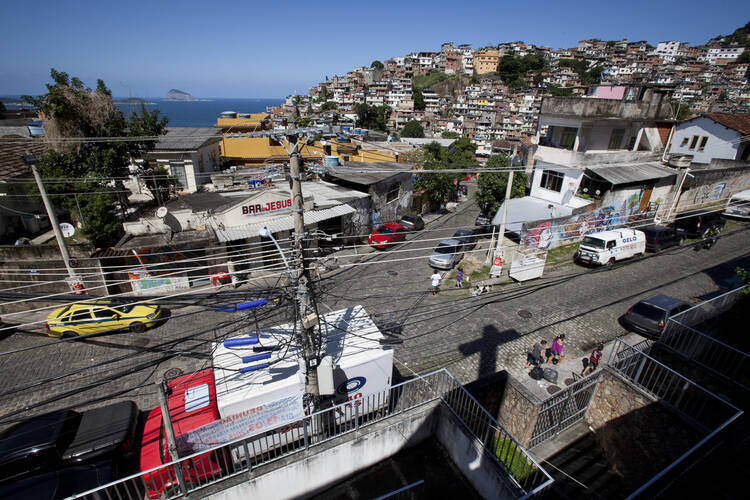Cardinal Oscar Rodriguez Maradiaga during the Q&A following his January 20th talk on “The Meaning of Mercy” at Santa Clara University.
INTERLOCUTOR: In the face of what you have said this evening and other times and what Pope Francis has said that so much today of the global economy is an economy that kills, an economy driven by idolatry, I wonder if you could comment more on those views, which have generated strong opposition in the United States among some listeners.
Well you know opposition isn’t bad in itself, because people can think diversely. The problem is when there is no option for dialogue, for serene dialogue. When you are in a position, like in a trench, defending your way of thinking not even questioning if it is right or not. This is the wrong way of approaching the problems. I believe that of course it is necessary to dialogue.
Nobody says that there is a perfect economic system in the world. And that some systems have defects, this is clear. If an economic system is producing an increasing inequality, should that be the best? It’s necessary to question, Why? And this is why sometimes what has been called in the social doctrine of the Catholic Church "savage capitalism,” it is not only a qualification, it’s true, when you see the results. When you see that poverty instead of diminishing is increasing, it means that something goes wrong. When you see that for instance in one developed country of Europe, there are eight million poor, something is not working. And it’s necessary to question that.
So when the pope talks in "Evangelii Gaudium" that this economy kills, it’s not only to say, Oh he comes from the Third World, he comes from Argentina, he doesn’t know the United States, for instance. It’s not a matter of fact. It’s to go objectively to the situation and to the results, and of course this kind of marginalization and leaving the poor to their own destiny kills. And if a system is killing, it’s necessary to correct it.
And this is why I believe the pope is promoting, sometimes provoking the reaction. Not to globalize, as he said in Lampedusa, not globalizing indifference, because this is one of the illnesses of today, indifference. “Okay, there are people dying in Iran, for four years now in a war? Who cares. It’s their problem.” Globalization of indifference.
We should be concerned, all the baptized, concerned by any war in the world. We cannot be indifferent. It’s necessary of course to be concerned about this.
What is my answer to this? Okay, We need to keep dialoguing. I remember eight years dialogue I was participating in with the people of the IMF, of the World Bank, of the Inter-American Development Bank, in order to have the alleviation of the external debt of the poorest countries. At the beginning they said, You priest have nothing to say to us of the work of the economy! After that, finally, in Gleneagles the achievement came, and the external debt of the 26 poorest countries was cancelled. Dialogue is the way to go. And it’s necessary to dialogue in order to correct the defects or illnesses of the economic situation of the world nowadays.
An economy that is reduced to speculation—this is one of the causes of the big crisis—an economy that is reduced not to thinking in the common good, but only thinking in the good of small groups—people who are becoming every day richer and richer and the difference between those who have most even though that they will never be able to expend. Accumulating riches, for what? Only when death comes, what happens to these big fortunes are causes of terrible fights, legal fights and battles—this is really nonsense. Economy is to make the life more human, more livable. And when economy is only trying to accumulate goods, it’s something ill inside.
So it’s necessary to question. When the Pope is denouncing something, it is not because he is against, no, it is because he wants something better, and it is necessary with dialogue to look. There is no perfect system, as I said, but it’s necessary to question, question when things go wrong, in order to make them go better.
The full video of his talk at Santa Clara can be found here. This question can be found at 50:30.








